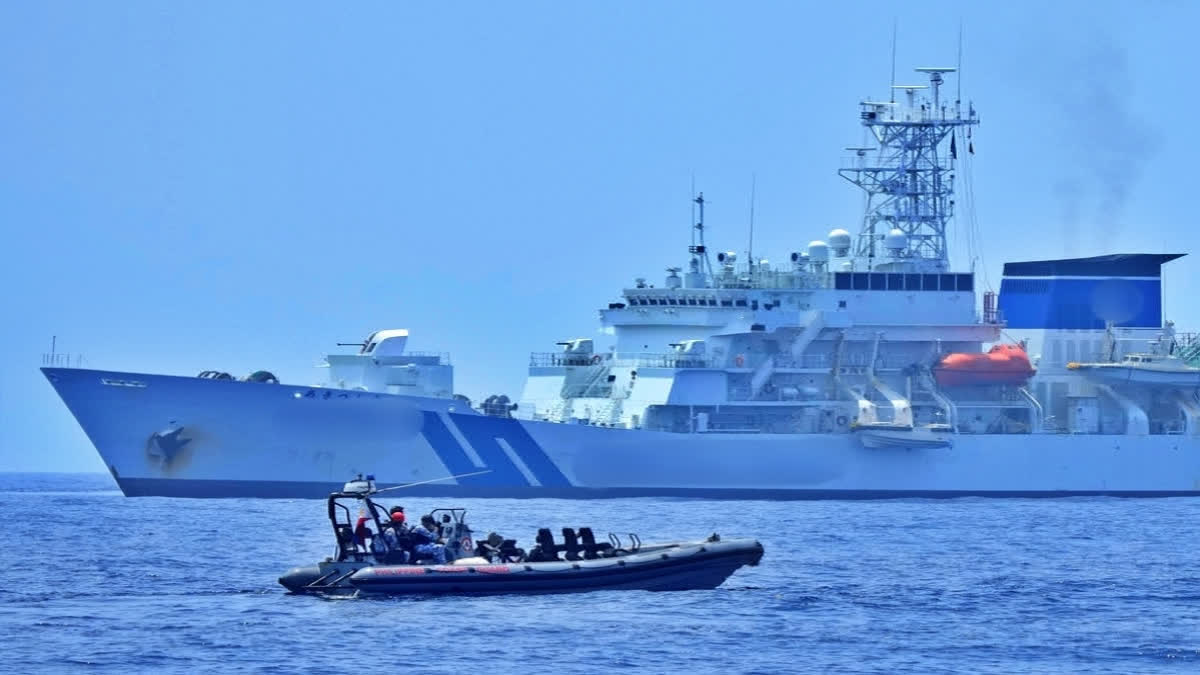New Delhi: Even as India is coming to terms with the fact that pro-China candidate Mohamed Muizzu has been elected as the President of Maldives, Sri Lanka has reiterated its support and cooperation for Chinese President Xi Jinping’s pet Belt and Road Initiative (BRI).
A joint statement issued following a meeting between Sri Lankan President Ranil Wickremesinghe and Xi in Beijing following the Belt and Road Forum states that under the leadership and guidance of leaders of both countries, China and Sri Lanka have achieved fruitful outcomes on Belt and Road cooperation.
“Sri Lanka reiterated it will continue to actively participate in the Belt and Road Initiative proposed by China,” the statement read. It also stated that Sri Lanka welcomes Chinese enterprises playing a positive role in its economic development and more investment from Chinese enterprises for which it will foster a favourable investment and business environment.
“China will continue to encourage competent Chinese enterprises to invest in Sri Lanka and conduct mutually beneficial cooperation,” the joint statement read. “The Colombo Port City and the Hambantota Port are signature projects of Belt and Road cooperation between the two countries. Sri Lanka welcomes further investment from Chinese enterprises, and expressed readiness to facilitate a conducive environment for investments in the Port City, including necessary legislative measures.”
India has been opposing the BRI since its inception as a key project under it, the China-Pakistan Economic Corridor (CPEC), passes through Pakistan-occupied Kashmir. And, as in the past, New Delhi again boycotted the Belt and Road Forum held in Beijing earlier this week. India and other major powers have also been raising concerns that countries participating in the BRI are getting into a debt trap.
Experts say that it is difficult for Sri Lanka to say no to China. China has made large investments in Sri Lanka. Colombo owes a lot of debt to China and Beijing is exploiting that. Then, earlier this month, China stepped in to lead Sri Lanka’s debt restructuring process taking the island nation’s other creditors, including India, by surprise. Beijing has made it clear it intends to keep Colombo in its hold.
Apart from this, China also keeps sending naval ships to Sri Lankan waters ostensibly for research purposes despite New Delhi raising its concerns repeatedly. India sees the region as falling under its sphere of influence. Meanwhile, India is facing a second challenge on the diplomatic front in the Indian Ocean region with Muizzu being elected as the President of the Maldives.
Muizzu is a protégé of the pro-China former President Abdulla Yameen. Muizzu had run his presidential campaign with an ‘India Out’ slogan. The ‘India Out’ campaign was aimed at sparking hatred by creating scepticism about India's investments in the Maldives, the defence partnerships between the two sides, and the presence of Indian security personnel in the Indian Ocean archipelago nation.
Also read: With Muizzu becoming Maldives President, India again faces Chinese challenge in neighbourhood
Immediately after he became President-elect, Muizzu, vowed to make ousting the Indian security personnel from his country his top priority after assuming office in November. And even as this report is being filed, reports have come in that Muizzu has asked the Maldives’ State Trading Organisation to postpone a pharmaceutical deal with an Indian company.
Although India continues to be an important partner of the Maldives, New Delhi cannot afford to be complacent over its position and must remain attentive to the developments in the Maldives. India must play a key role within the Indo-Pacific security space to ensure regional security in South Asia and surrounding maritime boundaries. China’s strategic footprint in India’s neighbourhood has increased. The Maldives has emerged as an important ‘pearl’ in China’s “String of Pearls” construct in South Asia.
Given the twin challenges arising out of Sri Lanka and the Maldives, how can New Delhi weigh its options? “It means that we will have to be on our toes,” Anand Kumar, Associate Fellow at the Manohar Parrikar Institute of Defence Studies and Analyses and an expert on South Asia, told ETV Bharat. “In the changed circumstances, India will require proactive diplomacy.”
Anand Kumar believes that India is facing a greater challenge in the Maldives because of the orientation of the new dispensation. “We are trying to highlight the importance of India for the Maldives and hope that they will not do anything that will be harmful to both countries,” he said.
In the case of Sri Lanka, Kumar said that Colombo’s debt restructuring deal with China has come with the understanding that the Indian Ocean island nation will remain a part of the BRI and not do anything that will not be viewed positively by Beijing. As for Chinese naval ships coming to Sri Lankan waters, Kumar said, “It looks like Sri Lanka will have to keep giving access to Chinese ships.”



